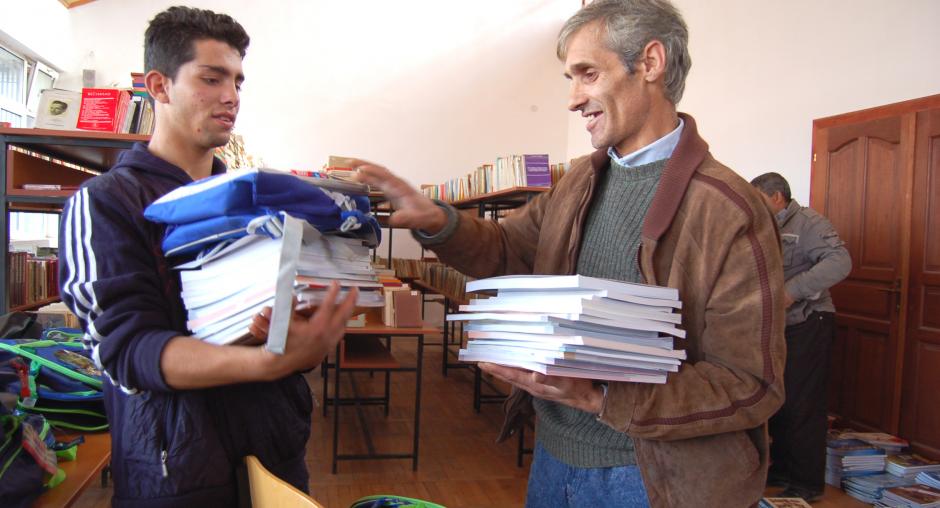OSCE facilitates primary education for girls from vulnerable communities
Sejdi Berisha, 43 years old, father of six, signs a piece of paper and piles a stack of schoolbooks onto his arms. With four children attending primary school and no job, Berisha has a hard time securing the books and other school supplies his children need.
Now, however, as a beneficiary of an OSCE library fund project, he has received a complete set of books for his two daughters attending the fourth and fifth grades at Sveti Sava-Aca Marovic primary school in Fushë Kosovë/Kosovo Polje.
"One set of books costs up to 80 Euros, which is more than the 75 Euros monthly social aid I get," says Berisha. "So, even if I spent a month's aid on books, I couldn't even buy them one set," he adds.
For reasons that include poverty, parental choices favoring boys, child labor, early marriage and girls being expected to perform housework and take care of younger siblings, a large number of Roma, Ashkali and Egyptian girls drop out of primary school after completing fourth grade. To help these young girls to continue attending classes and complete the nine years of education that are compulsory in Kosovo, the OSCE Mission has developed a project to provide them with books and other necessary school supplies, such as schoolbags and notebooks.
The schoolbook project
The project targets female Roma, Ashkali and Egyptian pupils in two Kosovo municipalities, Fushë Kosovë/Kosovo Polje and Mitrovicë/Mitrovica. Girls attending grades four to eight at the Serbian curriculum schools Sveti Sava in Fushë Kosovë/Kosovo Polje and Dositej Obradovic and Vlada Cetkovic in Mitrovicë/Mitrovica are receiving schoolbooks free of charge. Girls attending grades five to nine at the Kosovo education system school Selman Riza in Fushë Kosovë/Kosovo Polje are also included in the programme. Fifty-seven schoolgirls have received schoolbooks so far.
Mefail Mustafa, who manages the project at the OSCE Mission in Kosovo, says that the Roma community representatives approached the OSCE many times asking for help. "We came up with the solution of having a project that would last for five years, and would follow identified beneficiaries until they complete primary education," Mustafa explains.
The OSCE Mission's efforts to improve the accessibility of education to vulnerable groups builds upon previous initiatives, such as a project offering Roma catch-up classes, which ran between 2003 and 2008, and support to the development of the government strategy for the integration of the Roma, Ashkali and Egyptian communities in Kosovo.
Parents and school officials join in the effort
As part of the book project, a board consisting of school officials, parents and an OSCE representative was created at each of the four schools. "The board will manage the book fund, passing books on from one class to the next and making sure the list of beneficiaries is correct and updated," Mustafa says. "The board is also a good way to keep the parents active and committed," he adds.
Sala Shabani, 38 years old and mother of seven children, four of them project beneficiaries, is a member of the board at the Sveti Sava school. "This is big support for many families like mine. There was no way for me to buy books for my daughters, and it's a pity because they're good kids and learn well," she says.
Sanele Gashi, 13 years old, needs 18 books to take her through sixth grade. "I'm happy to have everything I need for my classes. I will do my best to maintain them so other kids can use them next year," she says.
The OSCE's involvement does not end here, but it is the board, functioning autonomously, that will do the work in the coming years, Mustafa says. "Meanwhile, we at the OSCE will try to come up with a small-scale follow-up project to reward students who bring back the books in good shape with a new schoolbag or similar item," he adds. "That way, more kids can benefit."

